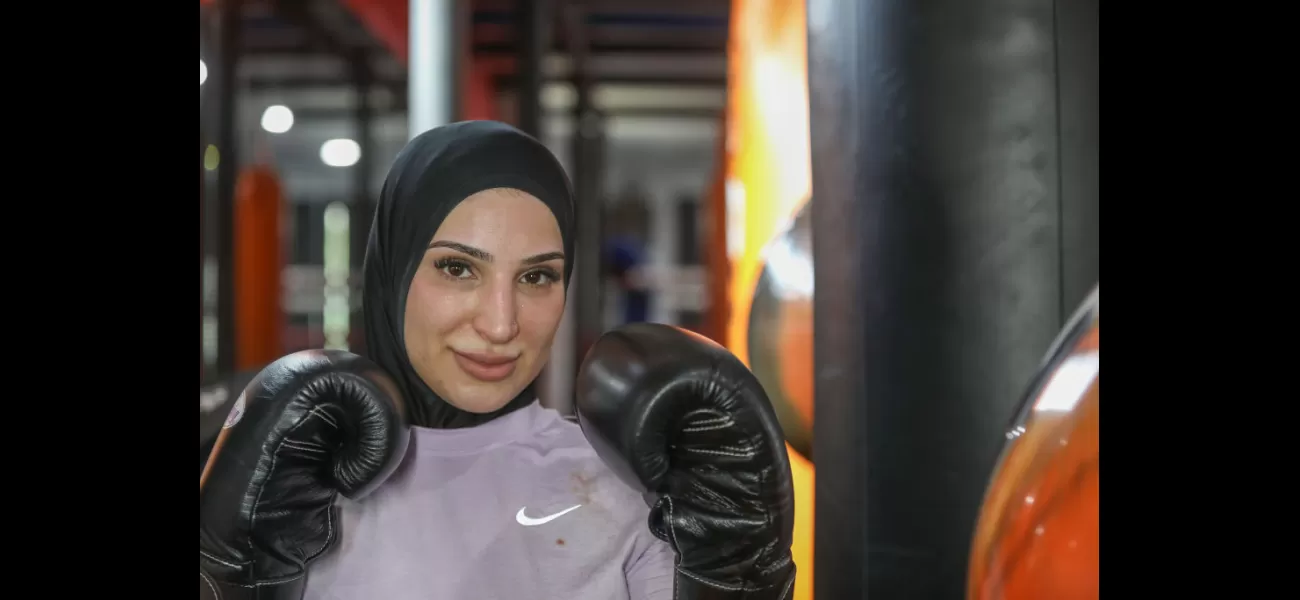France has prohibited hijabs at the Paris Olympics and a boxer has spoken out against the decision.
The rule causing controversy will not be lifted by the host country.
July 22nd 2024.

Professional boxer Tina Rahimi has expressed her disappointment and disapproval of France's recent decision to restrict Muslim athletes from wearing the hijab at the upcoming Olympic Games in Paris. This ban, which has caused quite a stir, has been met with strong opposition from various human rights and sports organizations since its announcement in April. Despite the backlash and demands for a reversal, French officials have stood firm in their stance.
In a video shared on her Instagram account, Rahimi, who proudly wears a full hijab during her fights, spoke out against the ban. "I am grateful that I am still able to participate in my hijab," she said, "but it is truly unfortunate for the athletes in France who are being affected by this rule. It has nothing to do with their performance and should not hinder their ability to compete."
So why exactly did France decide to impose this ban? According to French sports minister Amelie Oudea-Castera, it was done to uphold the principle of secularism. The International Olympic Committee (IOC) also stated that athletes representing France are considered civil servants and must adhere to French laws, which prohibit the outward display of religious symbols while acting in an official capacity.
This ban, however, only applies to French athletes, meaning that Olympians from other countries, such as Algerian table tennis star Lynda Loghraibi, are not affected. This has caused some to question the ban's validity and whether it goes against the IOC's own guidelines and France's obligations under international treaties. Amnesty International's women's rights researcher Anna Błuś called the ban "a mockery of claims of gender equality" and highlighted the underlying discrimination against Muslim women in French society.
In a report released last week, Amnesty International criticized the French authorities for their "discriminatory hypocrisy" in enforcing hijab bans in various sports. They also questioned the IOC's lack of pressure on France to reverse the ban, especially since it only applies to French athletes.
Rahimi, who won a bronze medal at the Commonwealth Games last year, questioned the reasoning behind the ban, stating, "How is my hijab going to affect anything?" She also expressed her support for her fellow French athletes, saying, "I stand by all the French girls... it's really unfortunate."
French basketball player Hélène Bâ also spoke out against the ban, calling it a violation of the Olympic charter and a restriction of their fundamental rights and freedoms. She added, "I think it's going to be a shameful moment for France."
It is clear that the ban on hijabs for French athletes has sparked a heated debate and raised concerns about discrimination and inequality in the country. As the world eagerly awaits the upcoming Olympic Games, it is hoped that a resolution will be reached that allows all athletes, regardless of their religious beliefs, to compete on a level playing field.
In a video shared on her Instagram account, Rahimi, who proudly wears a full hijab during her fights, spoke out against the ban. "I am grateful that I am still able to participate in my hijab," she said, "but it is truly unfortunate for the athletes in France who are being affected by this rule. It has nothing to do with their performance and should not hinder their ability to compete."
So why exactly did France decide to impose this ban? According to French sports minister Amelie Oudea-Castera, it was done to uphold the principle of secularism. The International Olympic Committee (IOC) also stated that athletes representing France are considered civil servants and must adhere to French laws, which prohibit the outward display of religious symbols while acting in an official capacity.
This ban, however, only applies to French athletes, meaning that Olympians from other countries, such as Algerian table tennis star Lynda Loghraibi, are not affected. This has caused some to question the ban's validity and whether it goes against the IOC's own guidelines and France's obligations under international treaties. Amnesty International's women's rights researcher Anna Błuś called the ban "a mockery of claims of gender equality" and highlighted the underlying discrimination against Muslim women in French society.
In a report released last week, Amnesty International criticized the French authorities for their "discriminatory hypocrisy" in enforcing hijab bans in various sports. They also questioned the IOC's lack of pressure on France to reverse the ban, especially since it only applies to French athletes.
Rahimi, who won a bronze medal at the Commonwealth Games last year, questioned the reasoning behind the ban, stating, "How is my hijab going to affect anything?" She also expressed her support for her fellow French athletes, saying, "I stand by all the French girls... it's really unfortunate."
French basketball player Hélène Bâ also spoke out against the ban, calling it a violation of the Olympic charter and a restriction of their fundamental rights and freedoms. She added, "I think it's going to be a shameful moment for France."
It is clear that the ban on hijabs for French athletes has sparked a heated debate and raised concerns about discrimination and inequality in the country. As the world eagerly awaits the upcoming Olympic Games, it is hoped that a resolution will be reached that allows all athletes, regardless of their religious beliefs, to compete on a level playing field.
[This article has been trending online recently and has been generated with AI. Your feed is customized.]
[Generative AI is experimental.]
0
0
Submit Comment





